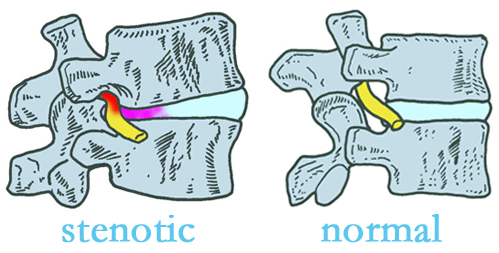A cushion. A spacer. A spring. A spinal disc. Pensacola Spinal Rehab Center
knows a lot about the spinal intervertebral disc!
Pensacola chiropractic back pain and neck pain patients value
that knowledge! The intervertebral disc in the human spine acts as a separator to hold the spinal bones apart, the vertebrae, apart and allows motion of the
spine. The disc also supports a large opening for the
nerves exiting the spine through which to pass. If this opening is
narrowed, which happens when discs degenerate
and lose height, the nerves passing through are compressed. This compression impedes
circulation to the nerve and inflammation of the nerve begins.
The shrinking of the nerve opening is called Pensacola
spinal stenosis. Shown here is a schematic and MRI depiction
of normal and stenotic nerve openings.

A SPRING
The intervertebral disc works
like a spring to hold the vertebra apart. The normal disc
therefore functions to stop
nerve compression and to allow spinal motion. When the disc
degenerates, or thins, it allows the adjacent vertebra to approximate one another, resulting in loss of motion, nerve compression, and pain in the back or down the arms or legs. What keeps the
intervertebral disc height? Normal discs have a content of a
chemical termed glycosaminoglycan (GAG) which permits
the disc to take in water from the fluid coming into the disc. In fact, the interior
of a healthy disc is 80% water. The GAG content in the
inner disc reduces significantly with degeneration, thus reducing
the water content of the disc. Disc water loss
due to GAG loss is called degeneration. Disc degeneration decreases
the ability of the disc to resist motion by over 65%. The inability
to control motion of the vertebrae is called instability. (1)
BENEFICIAL TREATMENT: COX® TECHNIC
Let’s look at two benefits for
the spine when Cox® distraction manipulation is delivered.
First, Pensacola Spinal Rehab Center offers a specialized type
of Pensacola spinal manipulation which increases the
disc space height, boosts the nerve opening size, drops
pressure within the disc to assist in circulation, restores
lost range of motion to the spine and creates nerve
conduction to the brain for pain relief. (4) This latter benefit is termed
afferentation. The manipulation undoes the effects of
gravitational and work effort changes in the spine that cause
spinal stenosis and loss of motion. A study revealed
that spinal mobilization with leg movement in patients with lower extremity
sciatica pain reduced low back and leg pain intensity, disability, pain; improved
range of motion of spine; and gratified patients in the short
and long term. (2) Pensacola Spinal Rehab Center
benefits Pensacola back pain sufferers’ discs!
Second, Pensacola Spinal Rehab Center may suggest nutritional
delivery of glycosaminoglycan by capsule which is improved
when combined with Cox® Technic. Combining these two
allows higher levels in the disc. The glycosaminoglycan absorbs water to nine times its own volume, producing
higher fluid content in the disc to improve both nerve opening
size and assist prevention of disc degeneration and inflammation. Folic
acid (Vitamin B9) contributes to peripheral nerve injury healing
by helping Schwann cell proliferation, migration,
and secretion of nerve growth factor. (3)
CONTACT Pensacola Spinal Rehab Center
Listen to this PODCAST by Dr. Jonathan Cerrutti as he shares his
chiropractic care of a painful, stenotic disc and spinal canal due to disc herniation on
The Back Doctors Podcast with Dr. Michael Johnson.
Schedule your Pensacola chiropractic appointment
today. Your Pensacola spine will appreciate the
attention you give its cushy, separating, springy spinal disc!